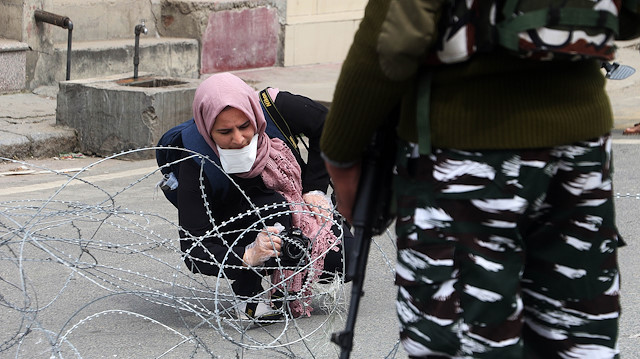‘Police action against scribes to silence voices in Kashmir’

In an interview with Anadolu Agency, author Gowhar Geelani, booked under anti-terror law explains threats to Kashmiri journos
Prominent Kashmiri journalist and author Gowhar Geelani, who has been booked by authorities in Indian-administered Kashmir for his social media posts said those critical of the government in the region are under the constant radar of security agencies.
“It takes a psychological toll on you when you are being watched. You remain more focused on safety than work, “said Geelani who has been charged under Unlawful Activities (Prevention) Act (UAPA)-- an Indian law aimed at combating terrorism.
A day earlier, 26-year-old woman photojournalist Masrat Zahra was also booked under the same law. Peerzada Ashiq, representing India’s one of largest circulated daily newspaper The Hindu was summoned to a police station and questioned about a story, which had appeared on April 19.
The police action against these journalists has invoked an international outrage.
On Thursday, Kashmir range police chief Vijay Kumar said that Geelani and Zahra were not booked for their activities related to journalism but for their social media activism.
He said their posts were “incendiary and challenged sovereignty and integrity of India besides attempting to instigate people to violence”. He said The Hindu representative Ashiq was questioned for his story about two families’ demanding bodies of their kin, who were killed in an anti-militancy operation.
In an interview with Anadolu Agency, Geelani who has sought judicial remedy said the police action was aimed at silence dissenting voices in Kashmir. His book Kashmir, Rage and Reason published last year received rave reviews and acclaim.
Anadolu Agency (AA): Many say persecution of journalists in Kashmir has a history. What is so new in you and the other two cases?
Gowhar Geelani (GG): Persecution of journalists is no doubt very old but its intensity has increased multifold since Aug. 5 last year when Kashmir was put under a clampdown. On Sept. 1, when I was leaving for a program with German broadcaster Deutsche Welle in Bonn, the Indian authorities stopped me from flying. Because they feared I might speak on what was happening in Kashmir. Since then, all people who have been critical of the government have been on the radar of security agencies. It takes a psychological toll on you when you are being watched. You remain more focused on safety than work.
The aim is to push one and only one narrative, to keep any critical view under the leash and to control the Kashmir narrative.
This assault on journalists is happening amid a pandemic when there are restrictions on movements. At this time, we have to seek legal help. A lawyer might refuse help because of health concerns. The state has silenced politicians, the pulpit, and other sections of the society. What remained were a few independent media voices.
-Police argument
AA: Inspector General of Police Vijay Kumar has said that they have not acted against you because of your journalistic works, but social media posts?
GG: Nothing can be farther from the truth. As if journalists have not been targeted for reporting in the past. Our colleagues Naseer Ganai and Haroon Nabi were booked for reporting a press release issued by a separatist organization last year. Hakeem Irfan of The Economic Times newspaper and Peerzada Ashiq of The Hindu were called to police stations and asked to reveal the sources of their stories. Journalists Azaan Javaid and Anees Zargar were beaten up by the police in full public view in December last year. I learned that I stand accused of using provocative adjectives. But as you must have seen, people have dug out the old tweets of the cyber police station head, in which he has used some very strong adjectives about Indian prime minister. If a police officer can have an opinion, a journalist is also entitled to have them. A journalist doesn't cease to be a journalist when he comments on social media. By booking us under a stringent law they want to warn others.
AA: You received support and solidarity from various quarters. The Editors Guild of India has also criticized the police’s decision to invoke the UAPA.
But Kashmir Editors Guild, the most influential media body in Kashmir remained silent. Why so?
GG: The local media has been silenced, more or less. After last year's August advertisements to some newspapers had been stopped and for a pretty long time, they did not even write editorials. They had articles on the health benefits of cucumber and political situation in Congo. What was shocking and what went unnoticed, is the fact that a prominent member of the Guild on April 12 effectively asked the government to arrest me and accused me of getting people killed. On two other occasions, he had threatened me on social media platforms but apologized saying he was under the influence of alcohol. I ignored it because I had started my career in his newspaper.
AA: You have sought a judicial remedy. What kind of relief do you want from the court?
GG: I have questioned the jurisdiction of cyber police. I have petitioned the court to quash the case and contended that the action is vindictive calibrated to wreck vengeance.
Cookies are used limited to the purposes of the Law on the Protection of Personal Data No. 6698 and in accordance with the legislation. For detailed information, you can review our cookie policy.







Comments you share on our site are a valuable resource for other users. Please be respectful of different opinions and other users. Avoid using rude, aggressive, derogatory, or discriminatory language.
Yükleniyor...